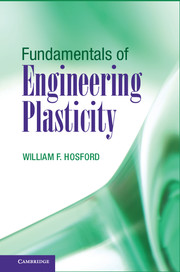Book contents
- Frontmatter
- Contents
- Preface
- 1 An Overview of the History of Plasticity Theory
- 2 Yielding
- 3 Stress and Strain
- 4 Isotropic Yield Criteria
- 5 Bounding Theorems and Work Principles
- 6 Slip-Line Field Theory
- 7 Anisotropic Plasticity
- 8 Slip and Dislocations
- 9 Taylor and Bishop and Hill Models
- 10 Pencil Glide Calculations of Yield Loci
- 11 Mechanical Twinning and Martensitic Shear
- 12 Effects of Strain Hardening and Strain-Rate Dependence
- 13 Defect Analysis
- 14 Effects of Pressure and Sign of Stress State
- 15 Lower-Bound Models
- 16 Plasticity Tests
- Index
Preface
Published online by Cambridge University Press: 05 June 2013
- Frontmatter
- Contents
- Preface
- 1 An Overview of the History of Plasticity Theory
- 2 Yielding
- 3 Stress and Strain
- 4 Isotropic Yield Criteria
- 5 Bounding Theorems and Work Principles
- 6 Slip-Line Field Theory
- 7 Anisotropic Plasticity
- 8 Slip and Dislocations
- 9 Taylor and Bishop and Hill Models
- 10 Pencil Glide Calculations of Yield Loci
- 11 Mechanical Twinning and Martensitic Shear
- 12 Effects of Strain Hardening and Strain-Rate Dependence
- 13 Defect Analysis
- 14 Effects of Pressure and Sign of Stress State
- 15 Lower-Bound Models
- 16 Plasticity Tests
- Index
Summary
In 1950, R. Hill wrote an authoritative book, Mathematical Theory of Plasticity that presented a comprehensive treatment of continuum plasticity theory as known at that time. Much of the treatment in this book covers some of the same ground but there is no attempt to treat the same topics treated by Hill. This book, however, includes more recent developments in continuum theory, including a treatment of anisotropy that has resulted from calculations of yielding based on crystallography, analysis of the role of defects and forming limit diagrams. There is a much greater emphasis on deformation mechanisms, including chapters on slip and dislocation theory and twinning.
This book should provide a useful resource to those involved with designing processes for sheet metal forming. Knowledge of plasticity is essential to those involved in computer simulation of metal forming processes. Knowledge of the advances in plasticity theory are essential in formulating sound analyses.
- Type
- Chapter
- Information
- Fundamentals of Engineering Plasticity , pp. vii - viiiPublisher: Cambridge University PressPrint publication year: 2013

